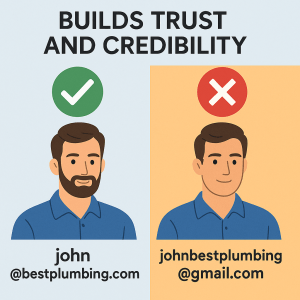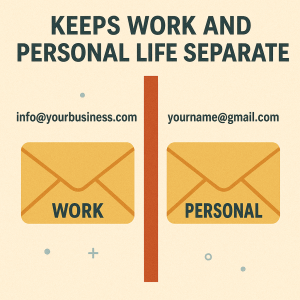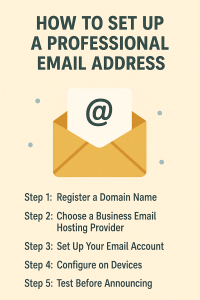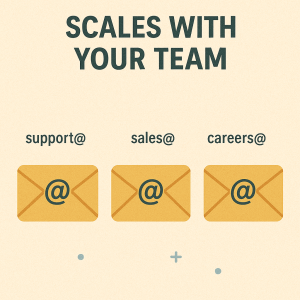Why Every Business Needs a Professional Email Address (And Why Liberation Email Is the Best Choice)
Your email address is one of the first impressions customers get of your business. If you are still using free Gmail, Yahoo, or Hotmail accounts, you might be unintentionally losing credibility. In the modern business world, professionalism starts with a domain-branded email—like [email protected]. It shows clients you’re serious, builds trust, and protects sensitive information.
But simply having a domain-based email isn’t enough. The email provider you choose matters as much as the email address itself. The wrong provider could expose your data, hurt deliverability, or limit your team’s productivity.
This guide will walk you through:
✅ Why professional email is essential for credibility
✅ How to set it up properly
✅ What to look for in a reliable email host
✅ Why Liberation Email + Hub for Teams are the smartest choice for businesses that value security, privacy, and scalability
Why a Professional Email Address Builds Trust
Would you hire a real estate agent using [email protected]? Most customers wouldn’t. A professional email instantly conveys legitimacy and makes you look established.
Studies show professional email addresses are 35–40% more likely to be opened compared to free accounts. People are naturally cautious of scams, and branded emails reassure them they’re dealing with a real business. If you want clients to take you seriously, your email address needs to reflect professionalism.

Professional Email Reinforces Your Brand
Every email you send is a branding opportunity. When you consistently use [email protected], you’re building recognition every time your email lands in someone’s inbox. If you send 50 emails daily, that’s 1,500 brand impressions a month—at no cost.
Free email accounts, on the other hand, dilute your brand. They don’t mention your business name, making it harder for clients to remember you. Your email should act as a digital business card that reminds people who you are and what your brand represents.
Better Deliverability and Spam Protection
Discoverability is critical. If your emails land in spam, you’re losing opportunities without even knowing it. Free accounts—especially when used for bulk emails or newsletters—are often flagged by spam filters.
Business email providers use authentication tools like SPF, DKIM, and DMARC to verify that you’re the legitimate sender, dramatically improving inbox placement rates. Without these protections, important proposals, invoices, or client follow-ups might never be seen.
Keep Personal and Professional Communication Separate
A professional email keeps your work life organized. Mixing personal and business communication often leads to lost client messages, missed follow-ups, and compliance issues.
For example, you don’t want a potential client’s email buried under personal newsletters or family updates. Having separate, dedicated business email accounts ensures that customer conversations are prioritized and easy to manage.

Scale Smartly With Team Email Addresses
As your business grows, email structure becomes even more important. Creating dedicated addresses like sales@, support@, and billing@ ensures every email reaches the right person.
Customers also perceive businesses with department-specific emails as more professional and trustworthy. It signals that you’re organized and serious about customer service. Even small businesses can benefit from this structure, making them appear bigger and more established.
Why Consumers Trust Professional Emails Over Free Ones
Phishing attacks are a major concern. The Anti-Phishing Working Group reports that over 90% of phishing attacks come from free email accounts. Customers know this, which is why they’re wary of businesses using free email services.
A domain-branded email reassures customers that they’re communicating with a legitimate business, not a scammer. Building trust is essential in sales, and a professional email address is one of the easiest ways to establish that trust.
The ROI of Professional Email for Small Businesses
Professional email isn’t an expense—it’s an investment. Hosting plans start at $3–6 per month per user, which is negligible compared to the return.
For instance, if your business lands just one $1,000 client per year because they trusted your branded email, that’s a 3,000% ROI. Professional email pays for itself many times over through increased conversions, better customer retention, and higher credibility.
Real-World Example: Lost Client Due to Free Email
One of our clients, a small marketing agency, lost a $20,000 contract because they used a free email account. The prospect admitted they didn’t feel comfortable working with a company that “looked unprofessional.”
After switching to [email protected], they saw a 30% increase in lead responses within 60 days. Something as simple as upgrading your email can directly affect your bottom line.

Step 1: Register Your Domain Name
Your domain is your digital identity. Choose a name that’s short, memorable, and matches your business name.
✅ Stick to .com if possible, or industry-specific domains like .tech or .co
✅ Avoid hyphens or complicated spelling
✅ Register with trusted providers like Liberation, Or Digital Ocean
A good domain not only improves your email credibility but also strengthens your brand across your website and social media
Step 2: Pick the Best Business Email Hosting Provider
This is where many businesses go wrong—choosing the cheapest or most familiar option. But security, privacy, and collaboration tools should guide your decision, not just price.
Free or low-quality providers risk poor deliverability, weak security, and no compliance features. If you handle sensitive information (legal, financial, healthcare), you need enterprise-level security even if you’re a small business.
Business Email Provider Comparison
| Feature | Liberation Email + Hub for Teams | Google Workspace | Microsoft 365 |
|---|---|---|---|
| Security | ✅ End-to-end encryption, 2FA, phishing protection | Basic encryption, data scanned for ads | Strong, but data stored in US corporate servers |
| Privacy | ✅ No ads, no data mining | Google analyzes metadata | Some analytics for corporate tracking |
| Collaboration | ✅ Shared inboxes, chat, video calls, file sharing in 1 hub | Multiple apps (Chat, Meet, Drive) | Teams & OneDrive (separate apps) |
| Cost for SMBs | ✅ Affordable & scalable | Gets expensive as users grow | Corporate-level pricing |
| Best For | Businesses valuing security & privacy | Freelancers, startups | Large corporate offices |
Why Liberation Email Is the Best Choice for Businesses
Liberation Email isn’t just another email provider—it’s built for business security and scalability.
✅ Privacy First – No ads, no data mining—ever.
✅ Bank-Level Security – End-to-end encryption, phishing protection, and two-factor authentication.
✅ Team Collaboration Hub – Chat, shared inboxes, video calls, and secure file sharing all in one dashboard.
✅ Affordable Growth – Perfect for SMBs that need enterprise-level tools without corporate pricing.
Hub for Teams: More Than Just Email—A Complete Productivity Platform
Most email providers stop at email. Hub for Teams takes it further, combining business email with collaboration tools your team actually needs.
With Hub for Teams, you get:
✅ Shared Team Inboxes – Perfect for managing group emails like support@ or sales@, ensuring no message gets lost or ignored.
✅ Built-In Team Chat – Communicate with your team in real-time without switching to separate messaging apps like Slack.
✅ Video Meetings and Screen Sharing – Hold secure video calls directly from your Hub, replacing third-party apps like Zoom.
✅ Secure File Sharing – Send, store, and manage files right in the Hub, keeping important documents encrypted and organized.
✅ Role-Based Access Control – Assign specific permissions to different team members, improving security and workflow efficiency.
Unlike Google or Microsoft, which scatter these tools across multiple apps, Hub for Teams integrates everything into a single dashboard. This saves time, reduces app fatigue, and keeps all communication securely under one roof.
For growing businesses, this isn’t just email—it’s a complete productivity platform designed to scale with your team.

How to Transition From Free Email to Professional Email
Switching from Gmail or Yahoo to a professional provider is easy:
-
Choose your provider (Liberation Email recommended)
-
Export your contacts from your old account
-
Import them into your new provider
-
Set up email forwarding to avoid missing old messages
-
Notify clients and update your signature with the new address
Step 3: Connect Your Domain
After choosing a provider, you’ll need to connect your domain.
✅ Update MX records with your provider
✅ Configure SPF, DKIM, and DMARC for deliverability
✅ Wait 24–48 hours for DNS propagation
Step 4: Create Your Email Accounts
Start with essential addresses, then expand:
-
info@ – general inquiries
-
support@ – customer service
-
billing@ – payments
-
yourname@ – personal business communication
Step 5: Set Up on All Devices
Your email should work everywhere:
✅ Desktop clients (Outlook, Apple Mail)
✅ Mobile apps
✅ CRMs & project management tools
Step 6: Test Before Announcing
Always test before making it public:
✅ Send test emails to ensure deliverability
✅ Check formatting on mobile & desktop
✅ Verify your professional signature
Craft a Professional Email Signature
A clean signature builds credibility. Include:
✅ Name & title
✅ Company name & logo
✅ Website link
✅ Social media icons
Keep it simple, consistent, and professional across all team members.
Use Filters & Auto-Responses
Filters help organize your inbox automatically, while auto-responses reassure customers their message was received. Support teams should always use auto-replies to acknowledge tickets.
5 Advanced Tips to Maximize Your Business Email
-
Use email analytics to track open rates
-
Create sales templates for faster responses
-
Regularly clean your contact list to improve deliverability
-
Use branded banners for promotional campaigns
-
Enable multi-device syncing for seamless access
Archive and Backup for Compliance
If you’re in a regulated industry, automatic archiving is essential. Liberation Email includes built-in archiving, ensuring legal compliance and secure storage of important conversations.
Maintain Regular Security Audits
Once a month, review:
✅ SPF/DKIM/DMARC configuration
✅ User access and permissions
✅ Password policies
Regular audits protect you from unauthorized access and data breaches.
Common Mistakes Businesses Make With Email
❌ Using free emails for business communications
❌ Ignoring spam authentication
❌ No standardized signature or branding
❌ Overlooking security updates and audits
FAQ: Professional Email for Small Businesses
1. Do freelancers need professional email?
Yes—clients trust freelancers with branded emails far more.
2. Can I migrate from Gmail to Liberation Email?
Yes, Liberation Email offers guided migration tools.
3. Is professional email expensive?
No—starting at a few dollars per month, it quickly pays for itself.
4. Can I create multiple addresses for my team?
Yes, you can set up aliases like support@ or sales@ easily.
5. Does professional email reduce spam?
Yes, authenticated business emails have higher inbox placement and less spam risk.
Final Thoughts: Stop Using Free Email for Business
A professional email is no longer optional—it’s essential for credibility, security, and customer trust.
While Google and Microsoft work for general use, Liberation Email + Hub for Teams are designed specifically for businesses that value privacy, security, and seamless collaboration.
📩 Upgrade to Liberation Email Today →
Secure. Private. Perfect for growing teams.
